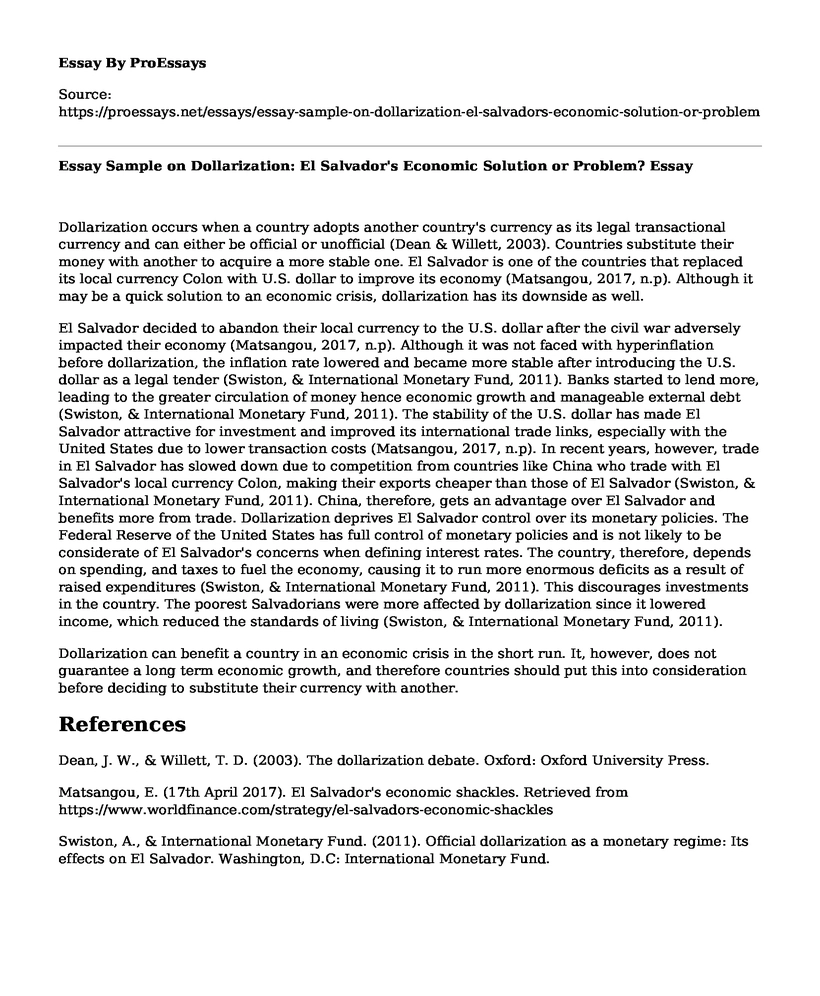Dollarization occurs when a country adopts another country's currency as its legal transactional currency and can either be official or unofficial (Dean & Willett, 2003). Countries substitute their money with another to acquire a more stable one. El Salvador is one of the countries that replaced its local currency Colon with U.S. dollar to improve its economy (Matsangou, 2017, n.p). Although it may be a quick solution to an economic crisis, dollarization has its downside as well.
El Salvador decided to abandon their local currency to the U.S. dollar after the civil war adversely impacted their economy (Matsangou, 2017, n.p). Although it was not faced with hyperinflation before dollarization, the inflation rate lowered and became more stable after introducing the U.S. dollar as a legal tender (Swiston, & International Monetary Fund, 2011). Banks started to lend more, leading to the greater circulation of money hence economic growth and manageable external debt (Swiston, & International Monetary Fund, 2011). The stability of the U.S. dollar has made El Salvador attractive for investment and improved its international trade links, especially with the United States due to lower transaction costs (Matsangou, 2017, n.p). In recent years, however, trade in El Salvador has slowed down due to competition from countries like China who trade with El Salvador's local currency Colon, making their exports cheaper than those of El Salvador (Swiston, & International Monetary Fund, 2011). China, therefore, gets an advantage over El Salvador and benefits more from trade. Dollarization deprives El Salvador control over its monetary policies. The Federal Reserve of the United States has full control of monetary policies and is not likely to be considerate of El Salvador's concerns when defining interest rates. The country, therefore, depends on spending, and taxes to fuel the economy, causing it to run more enormous deficits as a result of raised expenditures (Swiston, & International Monetary Fund, 2011). This discourages investments in the country. The poorest Salvadorians were more affected by dollarization since it lowered income, which reduced the standards of living (Swiston, & International Monetary Fund, 2011).
Dollarization can benefit a country in an economic crisis in the short run. It, however, does not guarantee a long term economic growth, and therefore countries should put this into consideration before deciding to substitute their currency with another.
References
Dean, J. W., & Willett, T. D. (2003). The dollarization debate. Oxford: Oxford University Press.
Matsangou, E. (17th April 2017). El Salvador's economic shackles. Retrieved from https://www.worldfinance.com/strategy/el-salvadors-economic-shackles
Swiston, A., & International Monetary Fund. (2011). Official dollarization as a monetary regime: Its effects on El Salvador. Washington, D.C: International Monetary Fund.
Cite this page
Essay Sample on Dollarization: El Salvador's Economic Solution or Problem?. (2023, Jan 22). Retrieved from https://proessays.net/essays/essay-sample-on-dollarization-el-salvadors-economic-solution-or-problem
If you are the original author of this essay and no longer wish to have it published on the ProEssays website, please click below to request its removal:
- Business Paper Sample - Cost Estimating in the Acquisition Field
- Operating (EBIT) Margin Research
- Essay Sample on Mickey Mouse Monopoly
- Essay Sample on Banking Industry
- Essay Sample on Rights and Responsibilities of Employees
- Paper Example on PNC: Comprehensive Banking Services for Individuals & Corporations
- New Markets, Lower Costs: Essay Sample on The Globalization of Business







